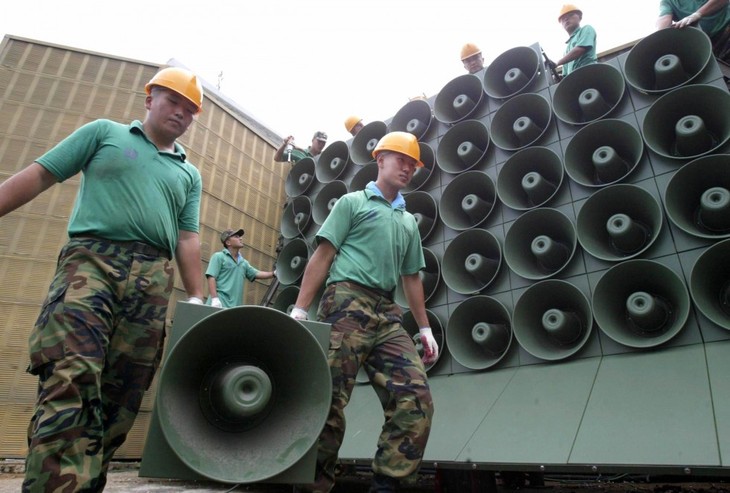(VOVworld) – The relationship between the two Koreas is tense, following South Korea used loudspeakers to blare anti-North Korea rhetoric across the border in retaliation for North Korea planting land mines in the Demilitarized Zone (DMZ) that wounded two South Korean soldiers last week.
 |
South Korean used loudspeakers to blame North Korea for the sinking of the warship Cheonnan in 2010 (photo: Reuters)
|
South Korean Unification Ministry spokesman Jeong Joon-hee says North Korea has rejected South Korea’s proposal for high-level talks.
Tension continues
Two South Korean soldiers were seriously injured in a landmine explosion on August 4 in the DMZ, in South Korea’s Gyeonggi province. The soldiers were part of a team conducting a routine search operation.
At a press conference on August 10, Major-General Koo Hong-mo, chief of operations for South Korea's Joint Chiefs of Staff, said an investigation indicated that North Korean soldiers crossed the DMZ to plant land mines near a South Korean border station. He said the action violated a peace treaty between the two Koreas and asked North Korea to apologize and punish the guilty parties. North Korea has not commented on the incident.
Bruising consequences on both sides
On August 10, South Korean Defense Ministry spokesman Kim Min Seok said Seoul has decided to resume its communications campaign, for the first time in 11 years, along the border with North Korea. Kim said the loudspeaker program calls the landmine explosion injuring two South Korean soldiers an act of provocation.
In 2004 South Korea and North Korea agreed to stop border communication warfare. In 2010 Seoul resumed the communication program using loudspeakers and disseminating leaflets along the border in retaliation for the sinking of the warship Cheonnan, for which South Korea blamed on North Korea. The communication program was later aborted when North Korea threatened to destroy the loudspeakers by artillery fire.
North Korea said last week it will adjust its time zone 30 minutes later than the standard time the two Koreas currently use on August 15, to mark the 70th anniversary of the Korean peninsula liberation from Japanese colony. South Korean President Park Geun-hye said North Korea’s unilateral time adjustment will widen differences and undermine efforts for inter-Korean cooperation and reunification.
More challenges to inter-Korean talks
On August 5, South Korea sent a letter on behalf of the Minister of Unification to North Korea’s United Front proposing high-level talks to discuss mutual concerns. So far North Korea has not accepted the invitation.
The South Korean government expressed its hope that inter-Korean relations will improve in the near future and promised to support cultural and sport exchanges. Last week, Lee Hee-ho, the wife of late President Kim Dae-jung, visited a pediatrics and obstetrics hospital, a retirement home for the elderly, and an orphanage in Pyongyang and donated medicines and necessities to the children.
South Korean President Park Geun-hye has urged North Korea to get involved in a trans-Siberia railway to Europe project. 87% of 500 South Korean companies say they are interested in doing business in North Korea when the two Koreas are unified.